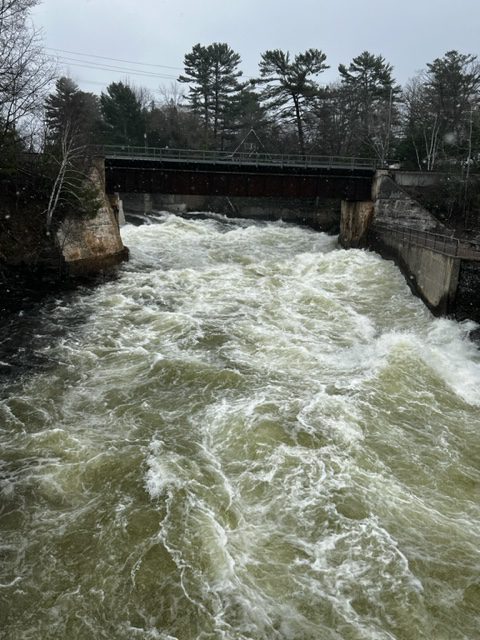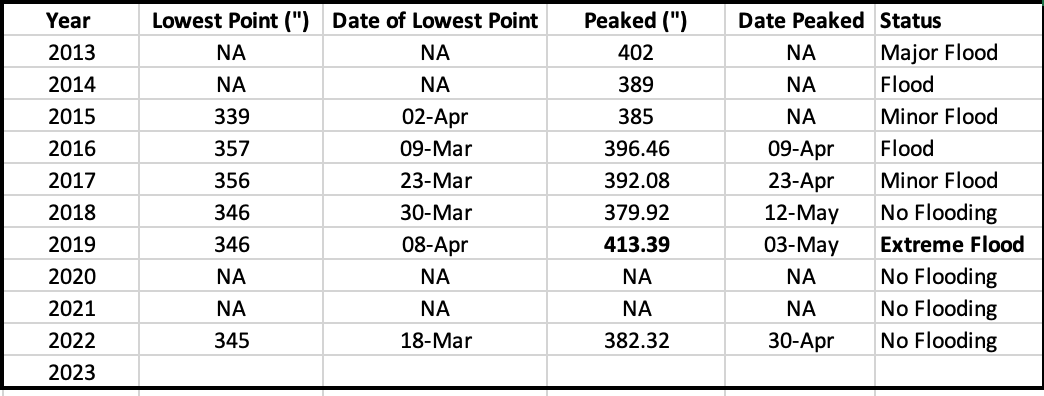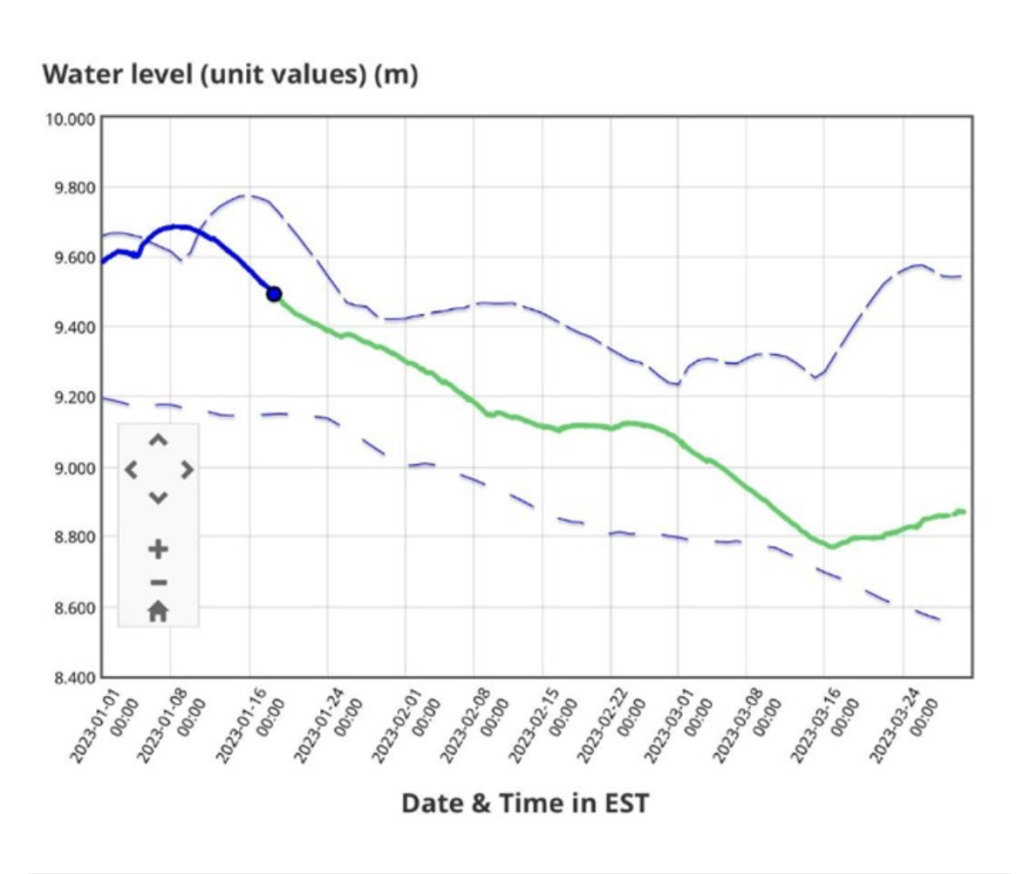100 year flood they said! Seems to be the 4 year flood now; queue Mother Nature! Many of you found me on Instagram or Facebook circa 2019 when my daily musings about flooding on social media became the most devastating of realities. Catch that recap here. April 18, 2023 started the Day 1 count of the latest Lake Muskoka flood, so once again I attempt to arm you with intel and answers to make your moves accordingly.
Coles Notes:
Why Almost Every Lakefront Cottager in Muskoka Should Pay Attention
- Water in Muskoka = connected.
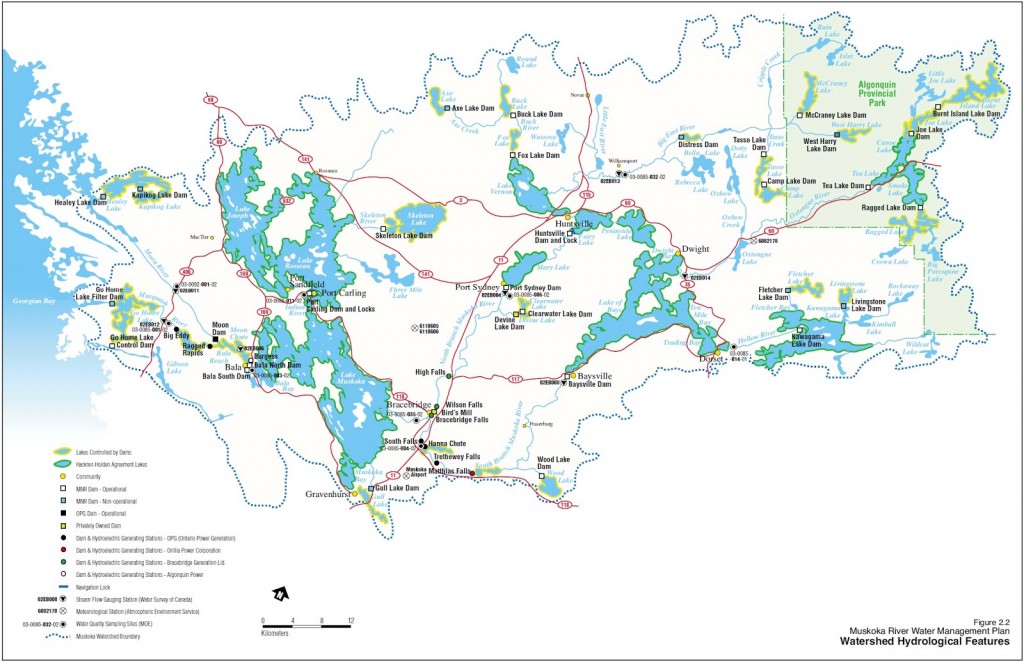
- Recall Lake Muskoka is the bathtub in the middle of Algonquin and Georgian Bay. The spring freshet from the North, South & Lower Muskoka watersheds all pass through and exit at Bala. With 2 entrances and 1 exit we don’t simply stand a chance, and when the water has nowhere else to go Lake Muskoka backs up into Lakes Rosseau and Joe.
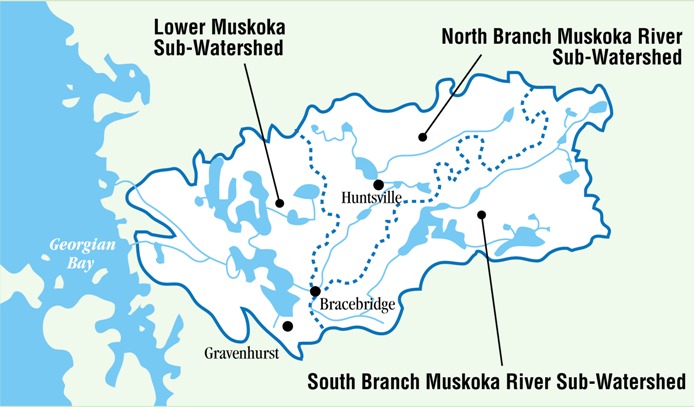
Who is Involved in Monitoring Water Levels?
The MNRF ultimately controls the level in that they make the decisions and operate the dams remotely, but while everyone was quick to point fingers after the historic 2019 flood debacle, there is only so much they can do. Mother Nature plays a huge roll in flooding and it’s an ever changing and constant mystery/battle. The issue is it’s a fine science. Just like any game of cards, there are odds and when you’re battling Mother Nature you can only take so much risk. The Muskoka River Water Management Plan [MRWMP] for establishing lake drawdown was updated in 2019/2020 and more info can be found here. What has remained constant in the last 10 years is the Normal Operating Zone markers (those two red lines in the chart below mark the top and bottom).
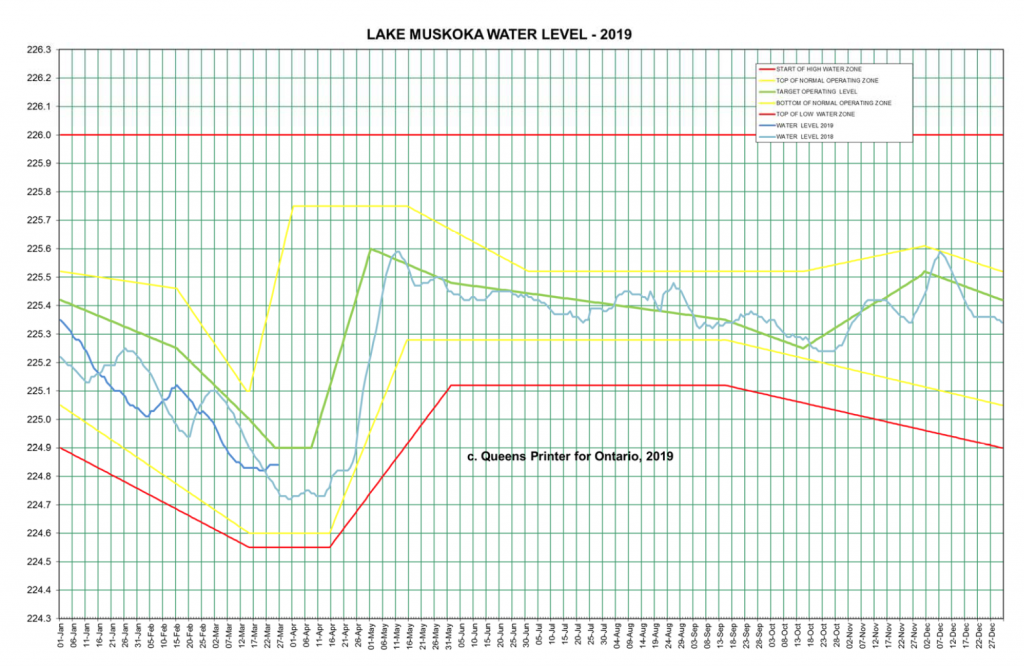
If the MNRF takes any more water out of Lake Muskoka then the red line dictates, the risk is that we’ll all be complaining, not to mention be boating around hitting new rocks and islands all summer long. Weigh the two weeks of high water and potential damage vs. an entire summer of low lake levels and I’m sure you can sympathize!
What is the Most Important Date of Flood Watch Each Spring?
March 15th!
The MNR controls the Lake Level using the following formula
- If the snow water content is >25% above normal on March 15 on the North Branch of the Muskoka River, lakes controlled by MNR will be lowered to the bottom of the Normal Operating Zone (NOZ).
- If snow pack water content is >50% above normal on March 15 on the South Branch of the Muskoka River, lakes controlled by MNR will be lowered to the bottom of the NOZ.
- If snow pack water content is >100% above normal on April 1 on both branches of the Muskoka River, lakes controlled by MNR will be lowered to the bottom of the LOZ (red line).
We ended 2022 with a late December thaw and rain which have disrupted the normal drawdown process. In March 2023 Lake Muskoka was therefore 6″ higher than what would be targeted this time of year. Continued drawdown of Lakes Muskoka, Rosseau and Joseph over the past two weeks have achieved lower levels comparable to last year. Recent daytime thawing has caused a plateauing in water levels where inflow is balanced by outflow. At these flow levels, flow choke points are not affecting lake levels and water levels are changing gradually.
The second most important date however, April 1st, ie #3, is yet to come. Stay tuned
When is their cause for concern?
When there is snow pack to the north. Rain from above is one thing to predict but we can easily measure snow to the north and translate that into a water content equivalent. Snow measurements are taken every other week at four stations across the Muskoka River watershed, are summarized in Table 1 below.
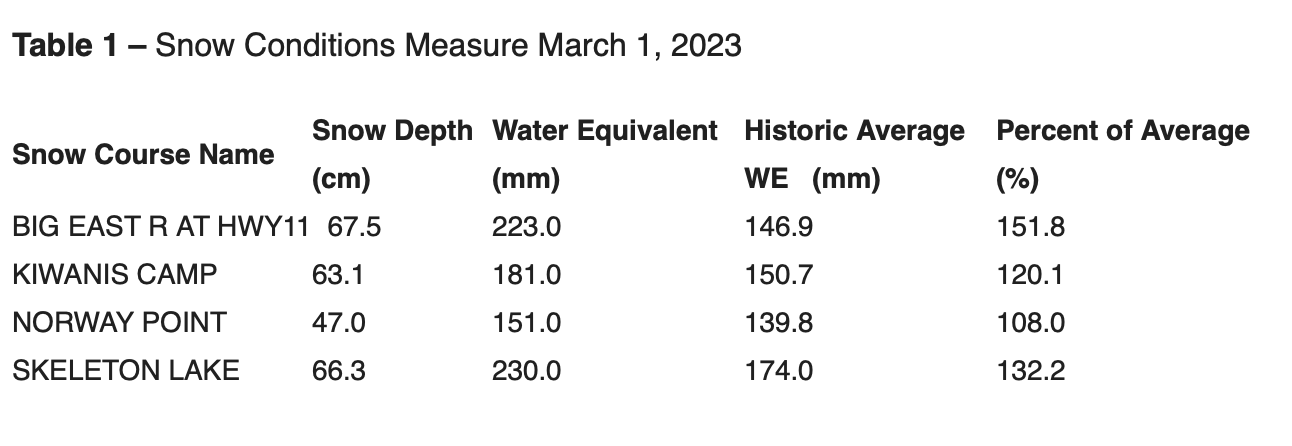
- The risk of flooding is elevated this year because the snow depth is well above normal. Lake levels are higher than they should be for the level of snow. Weather conditions which lead to flooding have been experienced already this winter: rapid thaws, cross continental low pressure systems [Colorado Lows, Texas Lows] bringing moisture from the warmer Gulf of Mexico or Pacific Ocean. Combinations of these factors acting together have led to floods in the past.
- The red flag here is that historical comparison below shows this exceeds the snow water equivalent conditions in 2013 when flooding occurred as per Table 2 below.
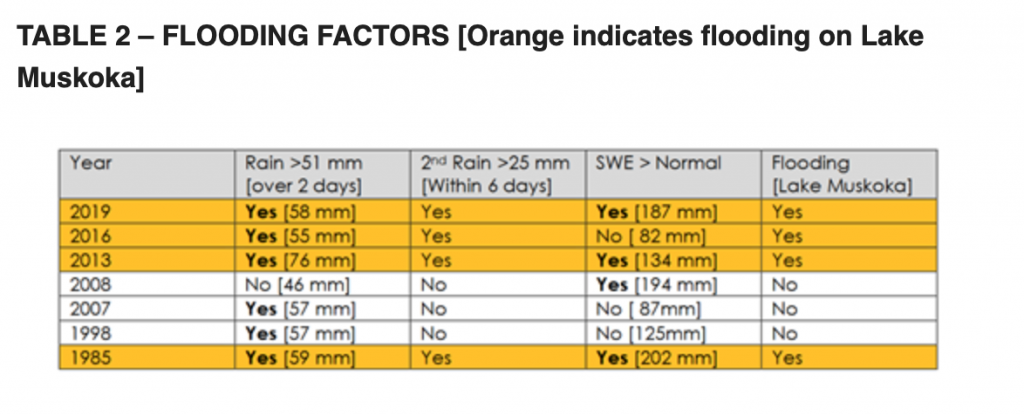
- In 2013 Lake Muskoka flooded 1.5ft as opposed to the 4ft of 2019 so is seemingly forgotten but most and nothing comparatively, but should there be 1.5ft of water over your dock and wind pushing around ice shoves that still has the potential to wreak havoc.
- Past flooding in Muskoka has resulted when adverse combinations of snow on the ground, rapid melting and heavy rains have simultaneously contributed more water to the lake basins than the lakes can accommodate. As shown in Figure 1 below, ground snow accumulation [which translates to an equivalent amount of water known as Snow Water Equivalent or SWE] above normal is the first risk factor
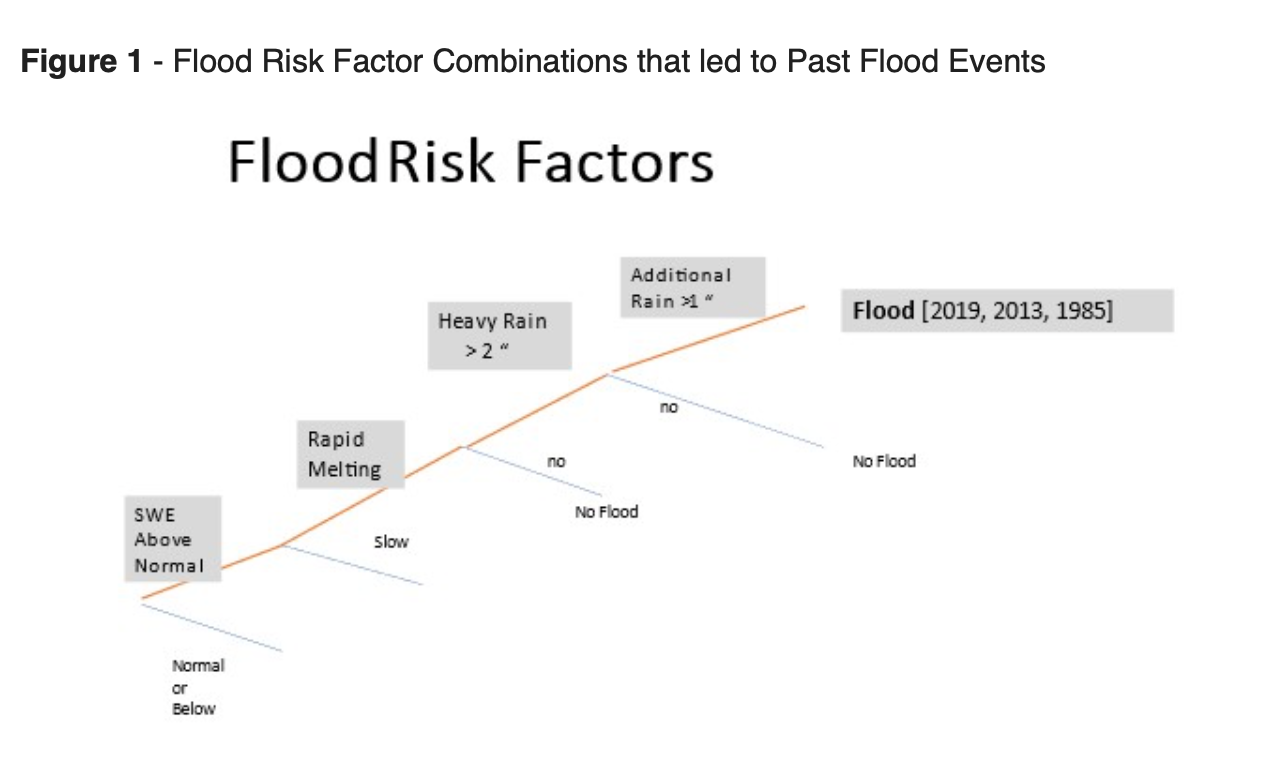
- Because snow levels are known ahead of time, lake levels can be adjusted proactively, but it takes time. If the accumulated snow is released quickly into the watershed by rapid melting AND the melt is also accompanied by consecutive heavy rain events then flooding results.
- The MRWMP recognizes the combined effects of melting temperatures and rain and prescribes lowering to the bottom of the NOZ. The Plan does not provide any guidance for snow plus melt plus rain. It also acknowledges that rain events are difficult to forecast ahead with adequate lead times for proactive management.
What are the key metrics and dates?
- Ice out for Lake Muskoka over the last 100 years is historically April 21st; in 2021 the ice went out early. I was skating on the lake March 16, 2021 and our first boat went in April 1st but didn’t make it over to my island until the 10th.
- The top of my island dock (which isn’t a low dock) sits at 384″
- Normal water levels for spring is around the 374″ mark; that’s the level the Lake needs to return to before Marina’s are able to safely start putting boats in the water!
How are we doing on floodwatch 2023?
The following graph is Lake Muskoka water levels from the lowest point on March 1, 2023 to March 25, 2023 (12am)
- Lake Muskoka hit its lowest level on March 16th 2023 (345″) and has risen gradually since then.
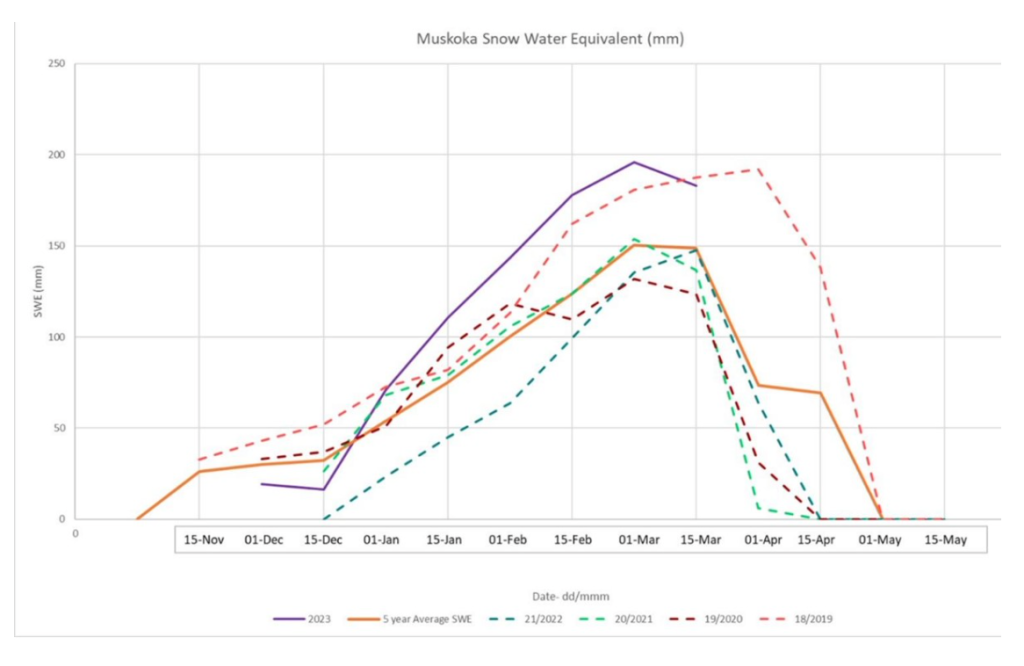
The 2023 Snow Water Equivalent [SWE] above – top blue line – is declining but still above the 2019 flood level – dashed line. So snow remains a potential flood risk in the watershed and the melt is drained through the length of the watershed without rain exacerbating conditions.
Fast Forward to April 2023
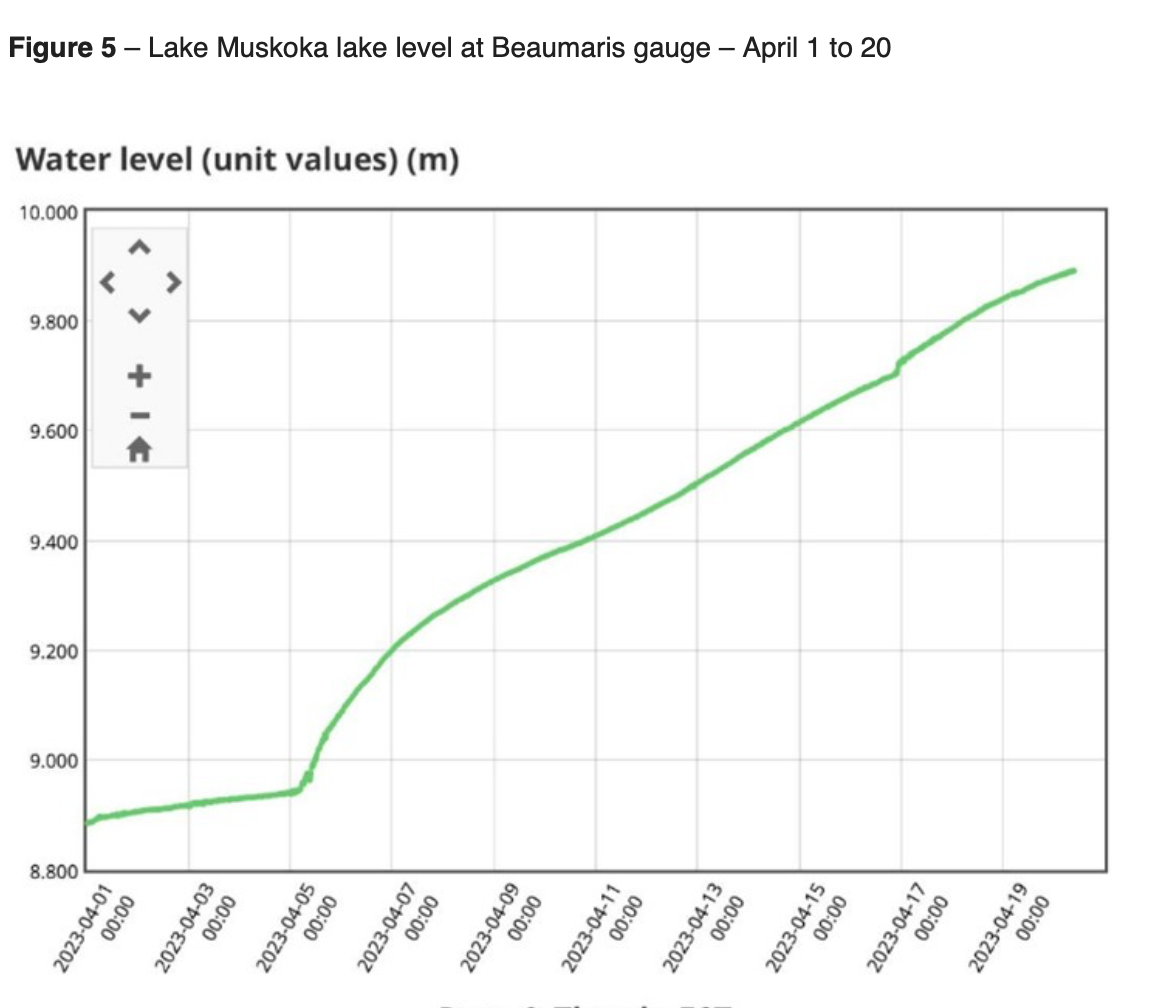
April 5th 2023 saw a dumping of rain and we’re now at the whim of Mother Nature. The forecast ahead doesn’t show much rain but the temps don’t show melting either. The MNR has done what they can and future water levels are now up to Mother Nature and topographic choke points in the lake system.
How Am I Feeling?
- Time to move low level belongings to higher ground.
Update: April 14, 2023 – Flood Warning Issued
- As per my instagram post on April 20, 2023 we’re on Day 2 on the 2023 Muskoka Flood. This Ix not going to be the flood of 2013 or 2019. Lake Rosseau and Lake Joseph are not going to flood. Lake Muskoka & the Moon River however are currently flooded. The North branch of the Muskoka River is stabilizing and the South branch of the Muskoka River is slowing down.
Where Did Things End Up in 2023?
- One word: FLOODED

- 2023 saw 66m of rain over 2 days; 25mm within 10 days; the SWE was > Normal at 176mm
- April 25, 2023 was the peak of Lake Muskoka water levels
- The good new is that this is much less than 2013 levels (and 2019 levels) but high water is expected to persist until Mid May so boating season 2024 delayed.
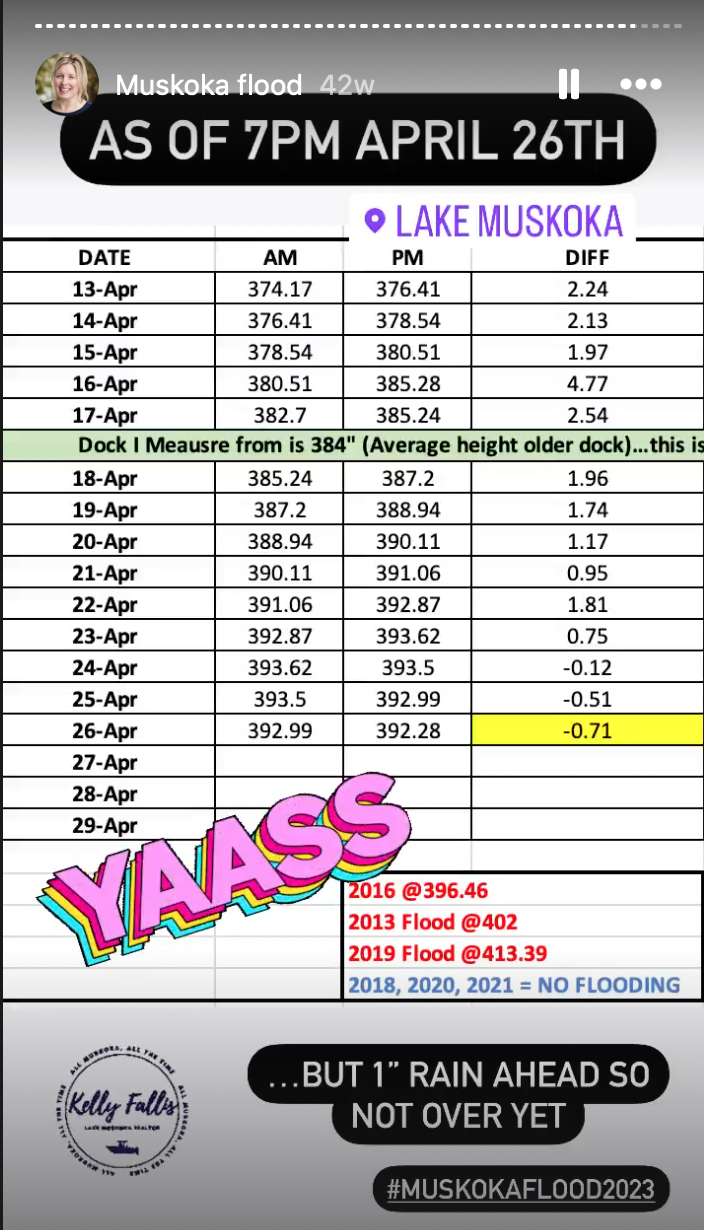
Who Am I Anyhow?
- I’m the data nerd constantly comparing accuweather to the weather network in the month ahead, and now obsessed with wind gusts
- I’m the Muskoka realtor who lives in my truck each spring so get endless vantage points as I cruise around Lake Muskoka properties
- I’m the 2019 impromptu Lake Muskoka flood reporter
- I’m the Islander who is dying to get back in my boat each spring
- I’m. the first person who DOES NOT want to be talking about Lake Muskoka flooding ever again, but I’m here and close to it as it happens so a great local resource who loves to share my findings.
- For regular updates however best to follow along on Instagram or Facebook and more likely tune into my midnight flood stories LOL #neverfails
PS If you’re new to Muskoka cottaging or flooding and want to see the destruction of 2019 I wrote about it on my building company site back in 2019 here and here

